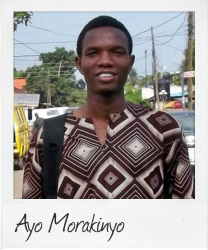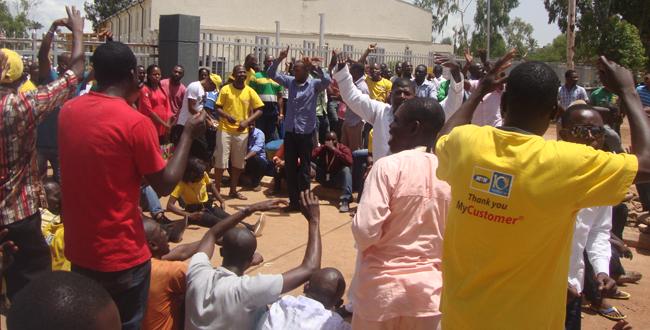“Revolution is incapable of resolving major problems”
December 25th, 2012 Revolution creates change in leadership, but it can also bring prolonged disorder, new political cliques, and armed violence, writes Ayo Morakinyo, 25, a Commonwealth Correspondent from Nigeria. Instead of rebellion, he advocates a mental revolution for both citizens and leaders.
Revolution creates change in leadership, but it can also bring prolonged disorder, new political cliques, and armed violence, writes Ayo Morakinyo, 25, a Commonwealth Correspondent from Nigeria. Instead of rebellion, he advocates a mental revolution for both citizens and leaders.
Today, many Nigerian youth are yearning for a revolutionary displacement of the nation’s leadership.
They want new and younger people to replace the incumbents, and are willing to achieve this objective through turmoil and rebellious revolution.
While I am indifferent to the age group of most African leaders, I strongly believe young people can also lead in certain quarters.
More concern should be given to leaders’ productivity than their ages. In the United States, the late Senator Robert Byrd (1917-2010) was West Virginia’s Senator from 1959 to 2010, making him the longest-serving member of the United States Congress. Recently, 19-year-old Proscovia Alengot Oromait was elected a Member of Parliament in Uganda by the people of Usuk. The electorate cast votes in her favour because they believe she will perform well in office.
In Nigeria some youth are even asking to reconfigure the three major ethnic groups into individual republics due to continued threats and attacks from Boko Haram, the seemingly uncontrollable forces of terrorism dominating the Northern region of the country. There is concern about leaders perceived to lack transparency, selflessness and integrity.
However, I am not fully convinced that a rebel-led revolution is the best way to create lasting and favourable change in Nigeria and other African societies. The anarchy of revolution is incapable of resolving the major problems in the continent. Though persistent aggression will eventually create change, such a change will come with its attendant problems. The socio-economic implications of prolonged disorder, the formation of new and stronger political cliques, and a need to eliminate the dangerous weapons that were instrumental in enforcing change are just some of the major problems that emerge after a typical armed revolution. The goings-on in Tunisia and Egypt have yet to persuade me to think otherwise.
Again, leadership inferiority is not absolutely the root cause of the challenges in Nigeria. Rather, it is one of the fruits of general citizenship misconduct. Bad leaders are citizens who were born by certain parents and groomed by some mentors. To identify the origin of the nation’s dominant problems, certain key questions must be answered: “Why did parenting and mentorship fail for many years without a rethink? Where were those who should have corrected our leaders when they started erring? How did parents and mentors become corrupt elders seeking gifts, cash prizes and contracts from persons for whom they should be responsible? Why did godfathers and elite elders become myopic for earthly interests?”
These questions should be answered and the lessons learnt should be applied now and in future.
The aftermath of uprisings will neither create instant employment for the majority nor bring more order into the society. In fact, leadership following a rebellion operates under high pressure because people’s expectations are elevated.
Instead, I hope for a mental revolution in the minds of both the citizenry and leadership of Nigeria. My utmost but challenging wish for Africa is to see all men from my generation on become responsible husbands and fathers worthy of emulation. When men hold dear their homes, peace and progress find their way into the communities that constitute nations. If this really happens, one day Nigeria will be the best country in Africa and our continent will benefit from it.
Photo: protesters chanting songs, mw.nl
…………………………………………………………………………………………………………………
About me:
I am a leisure writer and volunteer journalist and studied Electronic/Electrical Engineering at Ladoke Akintola University of Technology. I coordinate civic media activities at www.moraks.blogspot.com.
On days when I am not busy with engineering and management activities, I write prose poems, short stories and journalistic commentaries. In the coming years, I hope to help other people’s lives around the world and aid in the reformation ofAfrica.
…………………………………………………………………………………………………………………
Opinions expressed in this article are those of the author and do not necessarily represent the views of the Commonwealth Youth Programme. Articles are published in a spirit of dialogue, respect and understanding. If you disagree, why not submit a response?
To learn more about becoming a Commonwealth Correspondent please visit: http://www.yourcommonwealth.org/submit-articles/commonwealthcorrespondents/
…………………………………………………………………………………………………………………




